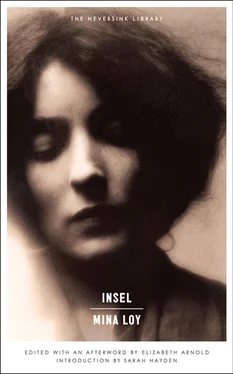“ Es war eine Schwartze und eine Blonde —”
“When was she black and blond?” I exclaimed, intrigued.
“Last night, outside the Select — I saw at once they had fallen for me,” said Insel, ignoring he had been fast asleep.
“But Insel,” I laughed, “can’t you remember how terribly miserable you are because you frighten the women?”
“All that is changed now,” said Insel looking me over with sadistic compassion.
Quite forgetting my determination to slug him — I glowed with the satisfaction of a successful psychiatrist—“I have cured him of his fixed idea—” I congratulated myself—
Then with his lightning variability of mood, his eyes diluting in a difficult introspection,
“Outside the Lutetia,” he pondered wonderingly. “That’s funny. I had exactly the same experience.”
“You couldn’t,” I was about to retort, “it’s not in Kafka,” but checked myself, wishing to keep him on the subject of his radiation.
“That’s why I adore talking to you — why I cannot allow you to suffer for me. I know too well what suffering is,”—and suddenly he threw up his head. The almost mummified chords of his throat vibrating in an ecstasy.
“ Die Liebe — wie schön — wie sch-ö öö — n —Love— the one beauty of Life.” He gloated with the same singing inflection with which he had been wont to celebrate steak. There is nothing else, he concluded. Evidently he was sane as any man in his therapeutic measures for saving woman from vain regret.
Without transition his fixed enchantment turned to a staggering stare. “ Die Liebe? — It’s the Strahlen !” he hooted across to me in the haunted voice of the obsessed.
“Insel,” I urged, bewildered, “don’t look like that. Your Strahlen are evidence of something in you — something noble.”
“ So edel —” I trilled in remembrance of my contact with that flawless spirit. But as if leaping out of himself for once to take stock of an Insel I did not know and as if what he saw was horrible, Insel took that clear, that soaring word and wrapping it in bitterness, hurled it at himself.
“So edel ,” he echoed, infinitely disabused.
“At all events,” I said as a pleasant jolt— “I am going to bring you your suit. You’re going to look so fine.”
As I passed the table I missed the phosphorescent bone.
“Hadn’t you a comb?”
“It’s here,” said Insel — stretching out a skeletal arm toward the floor — there stood his shoes. In one was stored the white comb. The other was stuffed with a huge white handkerchief. They were his wardrobe.
A warm appreciation stole around my heart for that adorable domesticity of the tramp, which first attracted me, when in my childhood, a clown, taking off his tattered overcoat displayed a wash-hand stand built into the lining.
At that moment my friend Insel was very dear to me.
Then in a sudden I realized how always, and inevitably in attempting to follow it, I must run off the track of Insel’s mind — himself unaware that nothing about him could ever stir from a so-mysteriously-appointed place, Insel had retrieved his comb pour se faire une beauté , awaiting my arrival with his breakfast!
With a kick of tiny annoyance at a toe of his wardrobe, “Personally, I do not admit the power of the microbe, but if you do — I fear you’ll be poisoned,” I warned him.
Then I gave him his suit.
When I came in again, Insel was pacing the studio in stealthy meditation. His mischievous assurance was so much his axis and at once so exteriorized that his whole implication seemed to have contracted to the finger of old fashioned comedians pressed to a nose under a crafty eyelid — Insel was feeling so sly— Then, going into reverse — as it was time for him to leave, he began fiddling abstractedly with a gratitude he did not know what to do with. “You have been very good to me,” he mumbled shamefacedly. “There is nothing I would not do for you — if ever,” inspired, “you have a pair of boots which need cleaning.”
“Insel,” I exclaimed encouragingly, “you needn’t say things like that about yourself.”
With a jerk he pulled himself out of an underlying complex.
“That was a figure of speech.” And inclining towards the couch with the bowing, palm-of-the-hand-drooping invitation with which saints in primitive pictures lead the eye to some sacred center, “Now you be ill, and go to bed so I can nurse you,” he pleaded adoringly.
I had to refuse. As I came to think of it, I wouldn’t know how to be nursed when ill.
So Insel, as if in prison or barracks, began folding up his sheets and blankets, I took a seat. With the stuff of my cape draping the chair, I felt like an emperor taking pride in a supreme buffoon.
There is no grace on earth to compare with a willowy man afflicted with levitation.
“It’s pure selfishness my allowing you to do this. It’s up to Bebelle — only I do so enormously enjoy your plastic geometry,” I observed to Insel, who, as if fitting a label to perfection, swayed his dreary silhouette of aereal bones, against a lifted sheet bleached in the reflection of his phosphorescence.
“If you want to make a fortune,” I advised him, “you should go on the Music Halls— Have you ever heard of Baggesson — one of the geniuses of the century? He broke white plates.
“You are even more wonderful folding white things up—”
“It would be utterly useless,” Insel protested. “Nobody ever sees in me what you see in me—”
“Well, you frighten the ‘people’ out of their wits, that ought to give you a hold on your audience. Of course, you’d need to rehearse— Have someone sit in the back of the theater and tell you where you get your effects. You should ‘come on’ in the fearful chatter of an earthquake and then all you’d have to do would be to leisurely tidy it up— I assure you you’d have the whole theater hallucinated.”
When he had stacked up his covers like a deck of cards, there was still one ceremony to perform, I took him into the kitchen and gave him whatever food there was left.
Under my eyes, as he packed it up, it diminished and froze into a Chinese puzzle. The essential, he said, was a minimum bulk. It did not in the least concern me that it would all be thrown away. His tying of the string was the close of a linear symphony.
Insel left with a farewell flash from his cranium and his forlorn-howl-in-the-wilderness of when shall I see you again— Then he crept back to the doormat and whispered shyly, “I shall explain everything to you next time.”
ON MY WAY TO THE STATION I CALLED ON MLLE Alpha. In her slacks of rust colored linen — her coppery hair, blown into a fresh sunburn, she appeared to have just sailed in from a lagoon.
Her eyes like coals, continent, of their fire, were round as the eyes of the wooden negresses supporting the violet draperies of her day-bed. Her lacquered toenails played at hide-and-seek among the meshes of her sandals. Her whole body was impudent with a slightly crass adolescence; it centered in her little tummy, which dared to be round.
A hard young apple — it was immediately plain to see, how, had one been on the other side of the fence of sex — one would have wanted to bite into it.
It was Insel who had sponsored our meeting and I gave her his message — that he would keep an appointment at five o’clock.
“He’s enthusiastic about you,” she said — then, “Would you think me very indiscreet if I asked you what you find to talk to him about for six hours?”
“Oh!” I explained loyally, “we exchange our little anecdotes. There’s the girl who went off with the Lesbian — it’s stupendous — to halt the endlessness of drama in the mere contemplation of a couple of shots.”
Читать дальше












